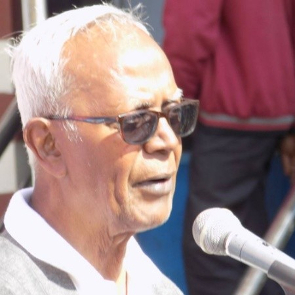Take Action for Father Stan Swamy
On 26 July 2018, a sedition case was filed against 20 people, including human rights defender Father Stan Swamy, for posting critical statements against the Jharkhand State Government, accusing the defender of inciting tension amongst adivasi (indigenous) people on the topic of the divisive Pathalgadi movement.
Fr. Stan Swamy is an indigenous people’s rights defender. He is the founder of Vistapan Virodhi Janvikash Andolan (VVJA), an all India platform for different movements that are campaigning against human rights violations caused by displacement of adivasi people, dalits, and farmers from their lands. The platform has supported vulnerable communities faced with displacement from extractive industry projects in securing their land rights and proposing sustainable development models instead.
On 26 July, a police inspector of Khunti Police Station filed a First Information Report (FIR) on the basis of his own statement against Fr. Stan Swamy. The police inspector alleged that the defender had been spreading anti-national propaganda and disrupting communal harmony through his posts on Facebook and social media. He accused Fr. Stan Swamy of playing a leading role in “manipulating the innocent and uneducated villagers” and instigating them towards anti-national activities. The police inspector also claimed that the human rights defender was trying to fuel riots in Jharkhand.
The FIR was registered under Sections 121, 121A and 66A of the Information Technology Act, and also included a sedition charge under Section 124 (A) of Indian Penal Code, which states that “whoever, by words, either spoken or written, or by signs, or by visible representation, or otherwise, brings or attempts to bring into hatred or contempt, or excites or attempts to excite disaffection towards a government established by law shall be punished with imprisonment for life, to which fine may be added”. Section 66A of the Information Technology Act was repealed by the Supreme Court of India in March 2015 but was still used in the FIR.
The Pathalgadi movement of the adivasi people is marked by the practice of erecting large stone plaques at the entry points of adivasi villages in Jharkhand. They are painted green and covered with constitutional provisions carved in white lettering. The leaders of the movement decided to carve the key provisions of the Panchayats (Extension to Scheduled Areas) Act, 1996, as messages on the stones to enlighten adivasi people about this law, which allows villages to constitute as administrative units. The movement stemmed from a two year long agitation against the government's proposal to introduce land acquisition laws, which would threaten the land rights of adivasi people.
I would like to express grave concern at the judicial harassment against Fr. Stan Swamy which it views as a tactic of intimidation employed on behalf of Jharkhand State Government in order to prevent him from carrying out his peaceful and legitimate work in the defence of human rights.
I urge the authorities in Jharkhand state and India to:
1. Immediately dismiss the First Information Report relating to the unfounded charges against Fr. Stan Swamy, as it is believed that it is solely motivated by his legitimate and peaceful work in defence of human rights;
2. Avoid releasing an arrest warrant against Fr. Stan Swamy;
3. Guarantee in all circumstances that all human rights defenders in India are able to carry out their legitimate human rights activities without fear of reprisals and free of all restrictions, including judicial harassment.

